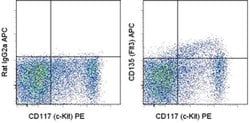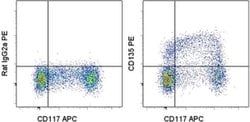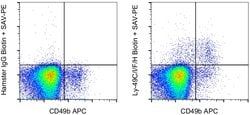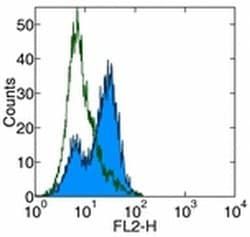VEGF Receptor 3 Monoclonal Antibody (AFL4), Biotin, eBioscience™, Invitrogen™
Manufacturer: Fischer Scientific
Select a Size
| Pack Size | SKU | Availability | Price |
|---|---|---|---|
| Each of 1 | 50-121-03-Each-of-1 | In Stock | ₹ 20,025.00 |
50-121-03 - Each of 1
In Stock
Quantity
1
Base Price: ₹ 20,025.00
GST (18%): ₹ 3,604.50
Total Price: ₹ 23,629.50
Antigen
VEGF Receptor 3
Classification
Monoclonal
Concentration
0.5 mg/mL
Formulation
PBS with 0.09% sodium azide; pH 7.2
Gene Accession No.
P35917
Gene Symbols
FLT4
Purification Method
Affinity chromatography
Regulatory Status
RUO
Gene ID (Entrez)
14257
Content And Storage
4° C, store in dark, DO NOT FREEZE!
Form
Liquid
Applications
Flow Cytometry
Clone
AFL4
Conjugate
Biotin
Gene
FLT4
Gene Alias
AI323512; Chy; chylous ascites; Flt4; FLT-4; FLT41; fms related tyrosine kinase 4; FMS-like tyrosine kinase 4; fms-related tyrosine kinase 4; LMPH1A; PCL; receptor protein tyrosine kinase; soluble VEGFR 3; sVEGFR 3; tyrosine-protein kinase receptor FLT4; Vascular endothelial growth factor receptor 3; vascular endothelial growth factor receptor-3; VEGF R3; VEGFR3; VEGFR-3
Host Species
Rat
Quantity
100 μg
Primary or Secondary
Primary
Target Species
Mouse
Product Type
Antibody
Isotype
IgG2a κ
Related Products
Description
- Description: The AFL4 monoclonal antibody reacts with the mouse VEGF receptor-3, also known as Flt-4
- This 195 kDa molecule was identified as an endothelial-specific member of the receptor tyrosine kinase (RTK) family
- During early embryogenesis all endothelial cells express VEGFR-3, while in the adult tissues, VEGFR-3 expression disappears from the vascular endothelial cells and is observed only on the lymphatic endothelium
- However, VEGFR-3 expression is induced in the adult tissue upon tumor implementation suggesting an important role for this receptor in the tumor angiogenesis
- VEGF-C and VEGF-D bind to and activate VEGFR-3
- AFL4 is an antagonist mAb
- Applications Reported: The AFL4 antibody has been reported for use in flow cytometric analysis
- Applications Tested: The AFL4 antibody has been tested by flow cytometric analysis of in vitro differentiated mouse endothelial cells
- In brief, mouse ES cells were incubated on collagen IV matrix for 4 days and subsequently stimulated with VEGF under serum free conditions to induce further differentiation
- This can be used at less than or equal to 0.5 μg per test
- A test is defined as the amount (μg) of antibody that will stain a cell sample in a final volume of 100 μL
- Cell number should be determined empirically but can range from 10^5 to 10^8 cells/test
- It is recommended that the antibody be carefully titrated for optimal performance in the assay of interest
- Filtration: 0
- Vascular endothelial growth factor is a key regulator of blood vessel development in embryos and angiogenesis in adult tissues
- Unlike VEGF, the related VEGFC stimulates the growth of lymphatic vessels through its specificl ymphatic endothelial receptor VEGFR-3
- In 1998, Dumont showed that targeted inactivation of the VEGFR-3 gene in mice resulted in defective blood vessel development in early embryos
- Vasculogenesis and angiogenesis occurred, but large vessels became abnormally organized with defective lumens, leading to fluid accumulation in the pericardial cavity and cardiovascular failure at embryonic day 9.5
- Thus, VEGFR3 has an essential role in the development of theembryonic cardiovascular system before the emergence of the lymphatic vessels.




